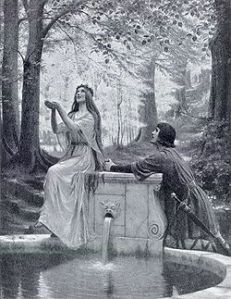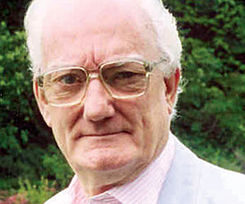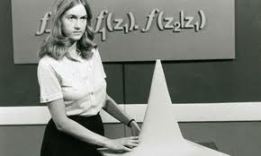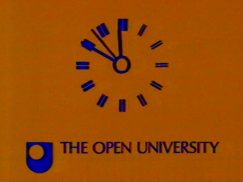Childhood television classics
January 27, 2013
Many of my posts are deeply nostalgic and self-indulgent under the guise of exploring some worthy and interesting subject. This one makes no attempt to hide.
I’ve often been startled when people with little experience of classical music announce that certain tunes, sometimes quite surprising ones, are ‘famous’. The reason of course is almost inevitably that they have been used in television, movies, or ads. Sometimes pieces of music borrowed in this way capture the imagination so effectively that they set down strong memories that last decades.
Looking back, I’ve tried to pull up some of these moments from my own musical pre-history, from the years before I was consciously exploring composers and compositions. Some of them are genuinely famous, but some attached themselves to me in a more personal way and are otherwise pretty obscure. I’ve limited my selection to television and completely avoided movies because that’s such a huge subject and, for me at least, TV is particularly about childhood.
I’ve been intrigued to consider what, if anything, each piece evokes to explain its use in its TV context. I’m sure some were simply random choices by people at the BBC, but others were undoubtedly deliberately picked for mood, evocation or more specific connections. I wonder what I would use if making these programmes. I’d be very interested to hear anyone else’s views and memories!
I have memories of this slightly eccentric daytime drama from way back in early childhood. It was shown on Granada TV from 1972 to 1984, and featured court cases in the fictional town of Fulchester acted out for judgement by real studio juries of local people.
The theme music from Janáček’s Sinfonietta (4th movement) must be one of the earliest pieces of music to really make a mark on me, and listening now it seems absolutely perfect for the context. Here’s the full movement on Spotify, and in a performance conducted by Rafael Kubelik:
The show itself is just beautifully dated and yet timeless: small town cops and robbers 1970s style!
2. The Sky at Night – Sibelius
An inspired choice; Sibelius at his most grandiloquent, evocative not just of Finnish lakescapes but absolutely of worlds beyond. The piece is At the Castle Gate from the incidental music to Pelléas et Mélisande.
Patrick Moore launched the programme in 1957 and it’s run ever since. Interestingly Sibelius died that same year, just a few months after the first Sky at Night. Was this theme used from the beginning, or was it introduced in response to the composer’s death? I don’t know. Here is the full piece.
This meant so much to me as as child! For me Patrick Moore was always, first and foremost, The Man Against Astrology, and to this day I have slightly overcharged reactions on that subject.
The full movement:
3. The Great Philosophers – Shostakovich
In the autumn of 1987 the notable philosopher, Wagner scholar and all round comedy intellectual Bryan Magee presented The Great Philosophers, his second series of 15 hour-long dialogues on the history of western philosophy. Brutally austere television of the highest calibre.
The music chosen was the trio from the second scherzo of Shostakovich’s eighth symphony, which is surely notable for the breadth of musical knowledge it implies in ever coming across it.
Shostakovich was the master of these really nasty grotesque little militaristic scherzos, a natural development in the Soviet era of one part of 19th century symphonic tradition. But this trio creates an interesting mood that I can’t quite find words for. I wonder if Bryan Magee picked it himself.
Here’s the whole scherzo on Spotify, and also a version accompanied by a great collection of old photos. The Great Philosophers part doesn’t start until just over half way through.
And a taste of the programme itself – A. J. Ayer on Frege and Russell:
4. Ludwig – van Beethoven
I don’t believe I’ve yet met anyone as an adult who remembers the cartoon Ludwig. But I’m sure there was a day in 1977 when absolutely everyone was squealing about it at school – not exactly a water cooler moment, but the nine year old’s equivalent.
Ludwig was a charming, peaceful, creative, strangely abstract egg-like character who mysteriously appeared in the forest and solved problems to assist the animals and birds. The 25 episodes were narrated by Jon Glover (voice of the birdwatcher), who watched and commented as useful and playful objects, such as umbrellas, telescopes and tennis rackets, emerged from the Ludwig-egg.
The series was created by father and son team Mirek and Peter Lang. I guess it was considered too surreal to commission any more. It’s all now available at www.iLudwig.co.uk
And of course, there was continual accompaniment with the music of Beethoven (arranged by Paul Reade), most strikingly the finale of the first symphony. Because of Ludwig, I’ve always been surprised to find that not everyone thinks this movement is ‘famous’.
Here it is on Spotify, and here are two samples of the magical world of Ludwig:
5. The Onedin Line – Khachaturian
Digging deep into the past again brings back The Onedin Line, a mercantile family saga set in 19th century Liverpool, of which nearly 100 episodes were screened between 1971 and 1980. This was definitely too grown up for me, but I have hazy memories of the general mood, period style and striking music.
Khachaturian’s Adagio of Spartacus and Phrygia, from his 1954 ballet about the Thracian gladiator, had nothing nautical in intent, but that’s almost hard to believe so sweepingly oceanic it feels. I wonder what he made of this, use or abuse?
This is more what the composer had in mind (plus the whole piece is here) :
6. Reilly, Ace of Spies – Shostakovich
More Shostakovich, and again from the eighties. His cheesy but charming Romance, from The Gadfly, was used in the 1983 miniseries about the life of Sidney Reilly, a British spy active around the time of the first world war with a legendary reputation for espionage and seduction.  Both the series and the tune were extremely popular at the time, and I think I even recall it being played on Top of the Pops, though that could be a false memory myth. Spotify link here.
Both the series and the tune were extremely popular at the time, and I think I even recall it being played on Top of the Pops, though that could be a false memory myth. Spotify link here.
There are some intriguing links behind all this. The Gadfly was a 1955 Russian film based on a novel by the fascinating Irish writer and revolutionary Ethel Voynich, who apparently had personal connections with the real Reilly.
7. Castrol GTX – Mahler
Music in TV ads is another huge subject, but I can’t resist including just one, especially as it’s a great example of the ‘wow that’s famous!’ moment – fantastic looks when this jolts the unexpected awake in the concert hall. And it’s a piece that certainly wouldn’t be famous if it weren’t for Castrol GTX, as its cryptic beauty is buried deep in one of Mahler’s least performed works, the 7th Symphony. Here’s a performance of the complete 2nd movement.
It was used in many variants and arrangements over the years of the campaign, but the early ads leaning on the mystery of the opening bars are the best.
8. The Open University – Salzedo
I almost overlooked this, but in a way it’s the most important of all for me, despite being only five bars of music.
Back in the 1970s, before 24 hour TV and technologies as basic as video recording, Open University students were condemned to actually tune in at specific obscure times of day and night to catch lecture broadcasts.  As a child I would occasionally dip into bits and pieces of incomprehensibly exotic arts and sciences, probably mostly when I should have been asleep, which exerted a magical intellectual pull towards adulthood and the whole outside world.
As a child I would occasionally dip into bits and pieces of incomprehensibly exotic arts and sciences, probably mostly when I should have been asleep, which exerted a magical intellectual pull towards adulthood and the whole outside world.
Individual courses probably had their own theme music, but what I clearly recall is the generic OU jingle that accompanied a twisty animated logo before and after every broadcast.
The music is by little known English composer Leonard Salzedo, from his Divertimento for 3 trumpets and 3 trombones (1959). Salzedo was by profession a ballet conductor, and as a composer he is best known for The Revenge of Frankenstein.
Very very rarely (probably to fill unscheduled gaps) the whole piece was played. Normally just the first ten second phrase. But it was enough – mysteriously conjuring up a powerfully expectant sense of aloof, abstract brainpower.
Here it is: http://www.televisiontunes.com/Open_University.html. (And here you can download the ringtone.)

January 27, 2013 at 22:28
I share your childhood memories of listening rapt to the themes of Crown Court, Ludwig, The Onedin Line and Castrol GTX, and soon discovering their provenance. But for too many years I just could not identify the thrilling music from this ad.
Aged 15, I finally discover, in a Torquay record shop of all places, on some TV Ads Compilation Album, that it was of course O Fortuna. I still remember my infuriation because I’d noticed ‘Carmina Burana’ before but never listened. I moved straight to the shop’s proper classical stacks and got the Handford/Halle Orchestra Classics for Pleasure LP.
January 27, 2013 at 23:06
You remember Ludwig, wonderful!
That old Spice ad is awesome! THE MARK OF A MAN
January 27, 2013 at 22:56
My one wasn’t classical music – an early intro to the Beatles with “When I’m 64” for Points of View
January 31, 2013 at 22:29
I look forward to dancing to that tune with you at some party we may hold in 2032!
January 31, 2013 at 18:30
I had a TV hiatus throughout my time at Manchester, so I never saw The Great Philosophers. Its theme “doesn’t start until just over half way through.” I can’t hear for myself – is it the jaunty yet sneering trumpet tune? DSCH 8 was among my first Shostakovich discoveries, so I can still recall that jabby, explosive movement and its nuclear detonation of a climax, and apocalyptic fallout.
January 31, 2013 at 22:24
Spot on James, the jaunty trumpet accompanied by rat-a-tat-a sidedrum. I agree, the 8th is one of his finest symphonic dramas. I’m going through a major Shostakovich phase right now, which has quite conveniently overlapped into this post.
February 2, 2013 at 22:19
Any idea which programme used one of Martinu’s Three Frescoes? Guess 1970s. It was driving me mad, and also I note it subsequently drove this forum mad too.
http://www.amazon.co.uk/forum/classical%20music/ref=cm_cd_pg_next?_encoding=UTF8&cdForum=Fx2OIXGG1AOK3Z9&cdPage=4&cdThread=Tx2YNIZT85MYAG4
and preceding pages.
I thought it might have been Bryan Magee’s cerebral series (hence my alighting here….) but I agree with the forum it was more of a current affairs programme.
February 3, 2013 at 13:00
Thanks for dropping by and drawing my attention to those Martinu pieces – I’d never heard them before. Those opening bars of the third do sound like a great theme for something! I sort of have a hazy half-memory of it, but it might just be my imagination. I’ll dig around and ask if anyone knows.
March 16, 2013 at 10:09
Not entirely relevant to TV, but to your lead-in re. how music attaches itself in personal ways, Land of Hope and Glory is attached about as deeply as you can imagine to me. As a 5 year old boy standing at the Portsmouth naval dock wagging his Union Jack voraciously as the largest object he had ever seen slowly edged its way toward him with Land of Hope and Glory blaring over the PA and competing with the deafening sound of harrier jump jet fly bys. At last the HMS Antrim had parked in front of me and soon enough I was picked up by my father, reunited after his tour of the Falklands. Safe again.